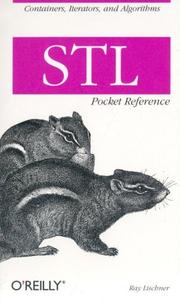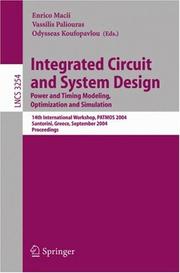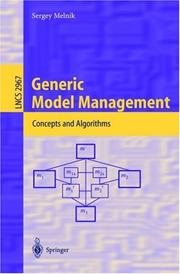| Listing 1 - 3 of 3 |
Sort by
|

ISBN: 0596005563 Year: 2004 Publisher: Sebastopol, CA : O'Reilly,
Abstract | Keywords | Export | Availability | Bookmark
 Loading...
Loading...Choose an application
- Reference Manager
- EndNote
- RefWorks (Direct export to RefWorks)


ISBN: 3540230955 3540302050 Year: 2004 Publisher: Berlin, Heidelberg : Springer Berlin Heidelberg : Imprint: Springer,
Abstract | Keywords | Export | Availability | Bookmark
 Loading...
Loading...Choose an application
- Reference Manager
- EndNote
- RefWorks (Direct export to RefWorks)
WelcometotheproceedingsofPATMOS2004,thefourteenthinaseriesofint- national workshops. PATMOS 2004 was organized by the University of Patras with technical co-sponsorship from the IEEE Circuits and Systems Society. Over the years, the PATMOS meeting has evolved into an important - ropean event, where industry and academia meet to discuss power and timing aspects in modern integrated circuit and system design. PATMOS provides a forum for researchers to discuss and investigate the emerging challenges in - sign methodologies and tools required to develop the upcoming generations of integrated circuits and systems. We realized this vision this year by providing a technical program that contained state-of-the-art technical contributions, a keynote speech, three invited talks and two embedded tutorials. The technical program focused on timing, performance and power consumption, as well as architectural aspects, with particular emphasis on modelling, design, charac- rization, analysis and optimization in the nanometer era. This year a record 152 contributions were received to be considered for p- sible presentation at PATMOS. Despite the choice for an intense three-day m- ting, only 51 lecture papers and 34 poster papers could be accommodated in the single-track technical program. The Technical Program Committee, with the - sistance of additional expert reviewers, selected the 85 papers to be presented at PATMOS and organized them into 13 technical sessions. As was the case with the PATMOS workshops, the review process was anonymous, full papers were required, and several reviews were received per manuscript.
Conferences - Meetings --- Engineering. --- Arithmetic and logic units, Computer. --- Logic design. --- Computer software --- Microprocessors. --- Computers. --- Electronics. --- Microelectronics. --- Electronics and Microelectronics, Instrumentation. --- Theory of Computation. --- Logic Design. --- Performance and Reliability. --- Processor Architectures. --- Arithmetic and Logic Structures. --- Reusability. --- Microminiature electronic equipment --- Microminiaturization (Electronics) --- Electronics --- Microtechnology --- Semiconductors --- Miniature electronic equipment --- Electrical engineering --- Physical sciences --- Automatic computers --- Automatic data processors --- Computer hardware --- Computing machines (Computers) --- Electronic brains --- Electronic calculating-machines --- Electronic computers --- Hardware, Computer --- Computer systems --- Cybernetics --- Machine theory --- Calculators --- Cyberspace --- Minicomputers --- Reusability of software --- Reusable code (Computer programs) --- Software reusability --- Software reengineering --- Generic programming (Computer science) --- Design, Logic --- Design of logic systems --- Digital electronics --- Electronic circuit design --- Logic circuits --- Switching theory --- Arithmetic and logic units, Computer --- Computer arithmetic --- Electronic digital computers --- Construction --- Industrial arts --- Technology --- Circuits --- Integrated circuits --- Very large scale integration --- Computer-aided design --- Information theory. --- Operating systems (Computers). --- Computer science. --- Informatics --- Science --- Computer operating systems --- Computers --- Disk operating systems --- Systems software --- Communication theory --- Communication --- Operating systems --- Computer software—Reusability.

ISBN: 1280307471 9786610307470 3540246843 3540219803 Year: 2004 Publisher: Berlin, Heidelberg : Springer Berlin Heidelberg : Imprint: Springer,
Abstract | Keywords | Export | Availability | Bookmark
 Loading...
Loading...Choose an application
- Reference Manager
- EndNote
- RefWorks (Direct export to RefWorks)
Many challenging problems in information systems engineering involve the manipulation of complex metadata artifacts or models, such as database schema, interface specifications, or object diagrams, and mappings between models. Applications solving metadata manipulation problems are complex and hard to build. The goal of generic model management is to reduce the amount of programming needed to solve such problems by providing a database infrastructure in which a set of high-level algebraic operators are applied to models and mappings as a whole rather than to their individual building blocks. This book presents a systematic study of the concepts and algorithms for generic model management. The first prototype of a generic model management system is described, the algebraic operators are introduced and analyzed, and novel algorithms for implementing them are developed. Using the prototype system and the operators presented, solutions are developed for several practically relevant problems, such as change propagation and reintegration.
Computer science. --- Software engineering. --- Logic design. --- Database management. --- Information storage and retrieval systems. --- Artificial intelligence. --- Computer Science. --- Information Storage and Retrieval. --- Database Management. --- Software Engineering. --- Artificial Intelligence (incl. Robotics). --- Programming Languages, Compilers, Interpreters. --- Logics and Meanings of Programs. --- Generic programming (Computer science) --- Computer Science --- Engineering & Applied Sciences --- Programming languages (Electronic computers). --- Information storage and retrieval. --- Software Engineering/Programming and Operating Systems. --- Computer programming --- Computer software --- Reusability --- Information storage and retrieva. --- Artificial Intelligence. --- Informatics --- Science --- AI (Artificial intelligence) --- Artificial thinking --- Electronic brains --- Intellectronics --- Intelligence, Artificial --- Intelligent machines --- Machine intelligence --- Thinking, Artificial --- Bionics --- Cognitive science --- Digital computer simulation --- Electronic data processing --- Logic machines --- Machine theory --- Self-organizing systems --- Simulation methods --- Fifth generation computers --- Neural computers --- Data base management --- Data services (Database management) --- Database management services --- DBMS (Computer science) --- Generalized data management systems --- Services, Database management --- Systems, Database management --- Systems, Generalized database management --- Computer software engineering --- Engineering --- Automatic data storage --- Automatic information retrieval --- Automation in documentation --- Computer-based information systems --- Data processing systems --- Data storage and retrieval systems --- Discovery systems, Information --- Information discovery systems --- Information processing systems --- Information retrieval systems --- Machine data storage and retrieval --- Mechanized information storage and retrieval systems --- Computer systems --- Electronic information resources --- Data libraries --- Digital libraries --- Information organization --- Information retrieval --- Computer languages --- Computer program languages --- Computer programming languages --- Machine language --- Languages, Artificial
| Listing 1 - 3 of 3 |
Sort by
|

 Search
Search Feedback
Feedback About UniCat
About UniCat  Help
Help News
News